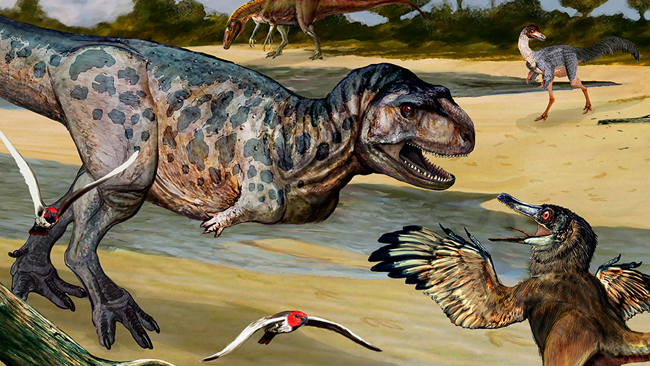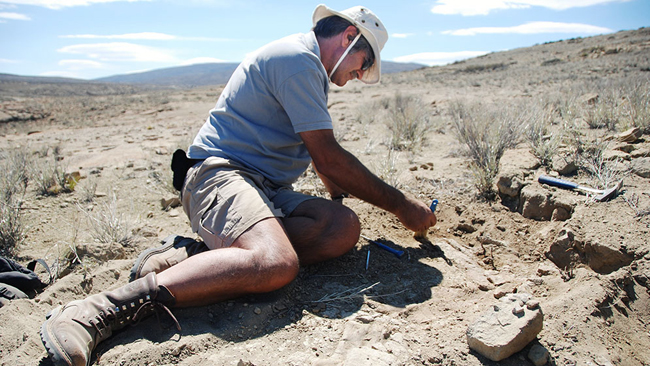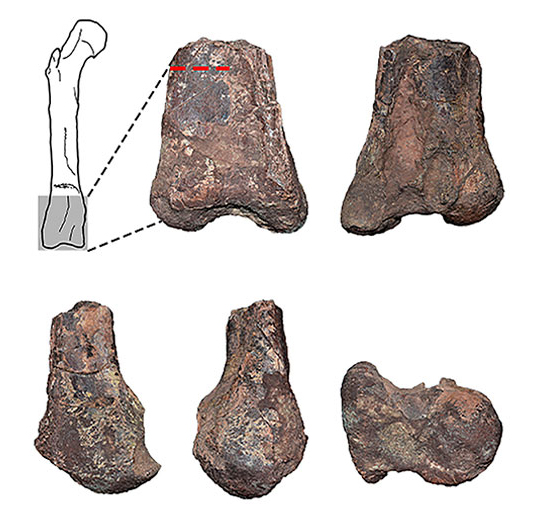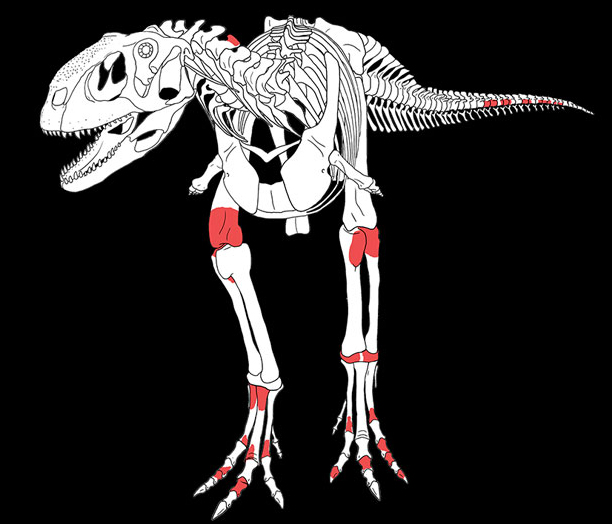A New Abelisaurid from Argentina
A new species of dinosaur has been described from fossils found in Neuquén Province (Argentina). Named Elemgasem nubilus it is the first unambiguous abelisaurid known from the Coniacian faunal stage of the Late Cretaceous.

A field team of CONICET researchers have excavated the fragmentary remains of a new species of carnivorous dinosaur from Upper Cretaceous exposures near to the city of Plaza Huincul, in the province of Neuquén in Patagonia (Argentina). The fossils come from the Portezuelo Formation and represent an individual animal around four metres in length and standing approximately two metres tall. Bone histology revealed that this abelisaurid was around eight years old when it died. The histological analysis suggests that Elemgasem probably would not have grown much bigger, making this predator much smaller than related abelisaurids such as Carnotaurus and Ekrixinatosaurus.
Regarded as a sub-adult, the scientists who include co-author Rodolfo Coria (Universidad Nacional de Río Negro, Argentina), writing in the journal of The Palaeontological Association conclude that this dinosaur had already reached sexual maturity.

Documenting the Evolution of the Abelisauridae
The Abelisauridae are a diverse group of medium-to-large-sized predatory dinosaurs predominately associated with the landmass of Gondwana. Numerous genera have been described based on fossils found in the Southern Hemisphere and they are known from almost all parts of Gondwana in all the faunal stages associated with the Late Cretaceous, except for the Coniacian (90 to 86 mya approximately).
This period in Earth’s history is marked by a turnover in terrestrial and marine fauna due to global climate change leading to worldwide extinctions.
Explaining the significance of these fossils, co-author Rodolfo Coria stated:
“The identification of a new species is always a scientifically relevant event, especially if the species belongs to an emblematic family of carnivorous dinosaurs such as the abelisaurs. Elemgasem represents a key piece in the puzzle of the evolution of this group, which began to be put together with the first findings of José Bonaparte, the most important Argentinean vertebrate palaeontologist of the 20th century – in the 1980s”
Although the fossil material is fragmentary, a new genus has been erected based on several autapomorphies including notable rugosity on the lateral surface of the fibula and the shape of the tail bones which are different from any other abelisaurid described to date.

The First Abelisaurid from the Portezuelo Formation (New Abelisaurid)
Elemgasem is the first abelisaurid described from fossils from the Portezuelo Formation and it was part of a diverse dinosaur-dominated terrestrial fauna with several different types of theropod present including dromaeosaurids, alvarezsaurids and megaraptorids.
Phylogenetic analysis indicates the E. nubilus could be tentatively assigned to the Brachyrostra tribe within the Carnotaurinae subfamily, although the limited amount of fossilised material prevented the researchers from making a more positive taxonomic assessment.
The genus name is derived from the name of a god in the regional Tehuelche culture and the trivial name is from the Latin for “cloudy days”, a reference to the strange, foggy conditions that the dig team encountered whilst they worked in the field.

Dr Coria added:
“We already knew of abelisaurian forms in older horizons [such as the Cenomanian] or more modern ones [such as the Campanian], so it was predictable that there would be some in intermediate times. What we did not expect was to find a comparatively small abelisaur like Elemgasem, whose size is clearly smaller than the rest of the species in the group, such as Carnotaurus, Aucasaurus or Skorpiovenator.”
It is the first abelisaurid from the Turonian–Coniacian interval and it increases the diversity of this theropod family at a time of marked turnover in the tetrapod fauna of South America.
Rebor has introduced several scale replicas of abelisaurid dinosaurs. To view the extensive range of Rebor models and figures available from Everything Dinosaur: Rebor Figures and Models.
Everything Dinosaur acknowledges the assistance of a media release from CONICET in the compilation of this article.
The scientific paper: “Elemgasem nubilus: a new brachyrostran abelisaurid (Theropoda, Ceratosauria) from the Portezuelo Formation (Upper Cretaceous) of Patagonia, Argentina” by Mattia A. Baiano, Diego Pol, Flavio Bellardini, Guillermo J. Windholz, Ignacio A. Cerda, Alberto C. Garrido and Rodolfo A. Coria published in Papers in Palaeontology.

